With Glowing Hearts
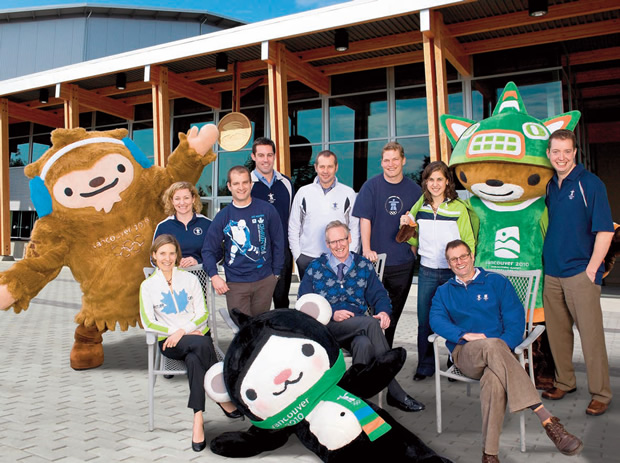
Team. Trust. Excellence. Sustainability. Creativity. These are the values adopted by the Organizing Committee for the 2010 Olympic and Paralympic Winter Games (VANOC). Such laudatory values have surely played a role in attracting a stellar team whose members include many QSB alumni (see sidebar on page 23). And it is With Glowing Hearts – VANOC’s new motto – that the entire 2010 team proudly embraces the opportunity to bring the Olympic Winter Games to Canada.
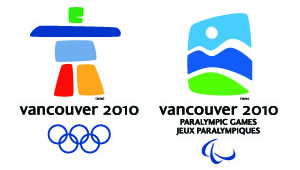 Leading the QSB contingent is Terry Wright, BCom’79, Executive Vice President, Services and Games Operations. He’s been with the project since its early days and was one of the key members of the team responsible for putting together the successful bid in 2003. The story of the bid and the other QSB alumni who made it happen appeared in the summer 2004 issue of Inquiry (QSB Magazine’s forerunner).
Leading the QSB contingent is Terry Wright, BCom’79, Executive Vice President, Services and Games Operations. He’s been with the project since its early days and was one of the key members of the team responsible for putting together the successful bid in 2003. The story of the bid and the other QSB alumni who made it happen appeared in the summer 2004 issue of Inquiry (QSB Magazine’s forerunner).
“It’s pretty special, having spent most of my career in this business – starting in Vancouver 25 years ago working for Expo 86 – to be organizing this major event, one generation later, in the same city,” Terry says.
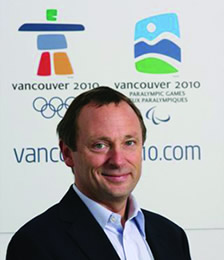 Terry Wright, BCom’79In addition to strategic planning, his portfolio encompasses all Games services, including media, villages, security and logistics. “Organizing a project of this scale and magnitude is a fascinating challenge,” he says. “I’m surrounded by great people with incredible drive, enthusiasm and skill, so it’s really special. I feel very lucky to be in this position. Every day is a learning experience since there’s no end to the challenge and complexity of this project.”
Terry Wright, BCom’79In addition to strategic planning, his portfolio encompasses all Games services, including media, villages, security and logistics. “Organizing a project of this scale and magnitude is a fascinating challenge,” he says. “I’m surrounded by great people with incredible drive, enthusiasm and skill, so it’s really special. I feel very lucky to be in this position. Every day is a learning experience since there’s no end to the challenge and complexity of this project.”
His colleagues can attest to his stamina. “Terry is like the Energizer Bunny,” says Chris Gear, BCom’95, LLB’98, Counsel in the Legal Affairs Department. “His schedule is packed so tightly I’m not sure he has time to eat. He has an uncanny knack for putting together deals and finding leverage where you thought there was none.”
It's No Coincidence That So Many Queen's Grads Are On The Vanoc Team, According To Terry Wright
 Another QSB alum is John McLaughlin, BCom’79, also profiled in the 2004 Inquiry story. Seven years after joining the bid team as Chief Financial Officer, he now holds the position of Executive Vice President and Chief Financial Officer of VANOC. With just over a year to go, VANOC has scored points by staying on budget, and John and his team intend to continue that trend. “We’ve spent only about 25 per cent of the $1.63 billion operating budget, so there’s well over a billion dollars yet to be both spent and received in revenue. Trying to stay in balance keeps us all on our toes.”
Another QSB alum is John McLaughlin, BCom’79, also profiled in the 2004 Inquiry story. Seven years after joining the bid team as Chief Financial Officer, he now holds the position of Executive Vice President and Chief Financial Officer of VANOC. With just over a year to go, VANOC has scored points by staying on budget, and John and his team intend to continue that trend. “We’ve spent only about 25 per cent of the $1.63 billion operating budget, so there’s well over a billion dollars yet to be both spent and received in revenue. Trying to stay in balance keeps us all on our toes.”
From the beginning, VANOC’s goal has been to complete all the Olympic venues on budget and ahead of schedule. This would give Canadian athletes two full seasons to train at the venues where they will be competing, adding to their home field advantage. That ambitious goal has already been achieved: All the venues have been completed well in advance of the Games – a first for any Winter Olympic Organizing Committee, according to Terry.
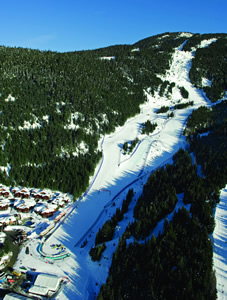 With the venues complete, the training is well underway, with the first of 17 international sports competitions this season having taken place in October. An Olympic hosting requirement, these competitions are an opportunity to test operations, train potential Games-time volunteers and ensure that the venues are up to world-class standards. “Along with the excitement and enthusiasm these competitions generate, they also drive home the reality of what’s coming in 2010,” notes Terry.
With the venues complete, the training is well underway, with the first of 17 international sports competitions this season having taken place in October. An Olympic hosting requirement, these competitions are an opportunity to test operations, train potential Games-time volunteers and ensure that the venues are up to world-class standards. “Along with the excitement and enthusiasm these competitions generate, they also drive home the reality of what’s coming in 2010,” notes Terry.
The verdict is in on the most recent of these events – a six-day short-track speed skating competition that garnered praise from that discipline’s technical committee.
“Some of these events held the year before the Games are the bargain of the century,” Terry explains. “You have the world’s best athletes competing at Olympic venues for a fraction of the admission price and you get a sense of what’s coming in the next year.”
Meanwhile, Phase 1 of the 2010 Olympic Winter Games ticket program received an overwhelming response, with many events already sold out. An estimated 120 of 170 ticketed sessions will be allocated by lottery, including the Opening and Closing Ceremonies, figure skating, short track speed skating, speed skating, and men’s ice hockey (from quarter-finals onward).
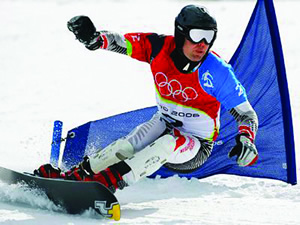 Whistler Creekside, the competition site for Olympic and Paralympic alpine events More than 100,000 tickets are available for $25, and half of all Games tickets are priced at $100 or less. Another option is to purchase a $22 ticket to attend medal ceremonies expected to attract close to 35,000 fans at venues in Vancouver and Whistler. “Spectators will see the athletes receive their medals and that day’s highlights on a big screen. Then the celebrations will continue with a nightly concert featuring leading Canadian acts,” Terry explains.
Whistler Creekside, the competition site for Olympic and Paralympic alpine events More than 100,000 tickets are available for $25, and half of all Games tickets are priced at $100 or less. Another option is to purchase a $22 ticket to attend medal ceremonies expected to attract close to 35,000 fans at venues in Vancouver and Whistler. “Spectators will see the athletes receive their medals and that day’s highlights on a big screen. Then the celebrations will continue with a nightly concert featuring leading Canadian acts,” Terry explains.
Of course, planning for the unexpected is also part of the job. The current global financial crisis is one example of a completely unforeseen scenario. ”We’re looking at what we can defer making commitments to, or reduce the scope of, to give ourselves a bit more of a financial buffer,” explains Terry. “I don’t think anyone really knows where this is heading, and in this climate of uncertainty, we’re going to be more conservative, just like any business.”
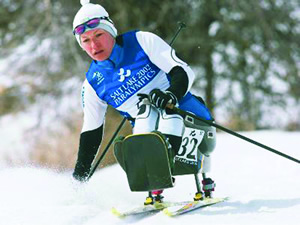 undefined The VANOC team has been hard at work developing contingency plans governing a host of potential crises, such as a rockslide like the one this summer that closed the Sea-to-Sky Highway between Vancouver and Whistler. Hundreds of such scenarios will be modeled, according to Terry. “We have to plan for all kinds of issues by developing simulations, asking ‘What if this happens?’ ‘Did we have the right response?’ ‘Would we have done things differently?’ It’s important to practise and anticipate all kinds of scenarios – weather delays, power losses, transportation problems and the like. You want the team to have considered all possibilities in order to be as prepared as possible for all eventualities.”
undefined The VANOC team has been hard at work developing contingency plans governing a host of potential crises, such as a rockslide like the one this summer that closed the Sea-to-Sky Highway between Vancouver and Whistler. Hundreds of such scenarios will be modeled, according to Terry. “We have to plan for all kinds of issues by developing simulations, asking ‘What if this happens?’ ‘Did we have the right response?’ ‘Would we have done things differently?’ It’s important to practise and anticipate all kinds of scenarios – weather delays, power losses, transportation problems and the like. You want the team to have considered all possibilities in order to be as prepared as possible for all eventualities.”
Another vital aspect of Games preparedness lies with the 2010 medical team, whose members include Dr. Michael Wilkinson,MBA’02.
Mike’s team is responsible for all Host Medical Services, including health care at the venues and athletes villages in Vancouver and Whistler. The challenges right now are mainly logistical, explains Mike. “We’re integrating with local health care partners to make sure all venues have the necessary resources and staff, as well as co-ordinating with emergency health care such as ambulance and helicopter evacuation, and with the National Olympic Committees.”
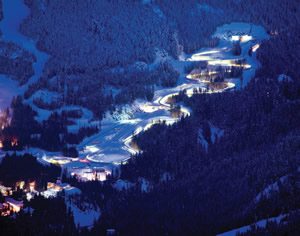 With a medical specialty in sports medicine, Mike jumped at the chance to become the team doctor for Canada. “It’s a once-in-a-lifetime opportunity to be a part of the 2010 Games and to create incredible legacies for future events. It’s unbelievable to see how the energy of everyone involved galvanizes the community and the country.”
With a medical specialty in sports medicine, Mike jumped at the chance to become the team doctor for Canada. “It’s a once-in-a-lifetime opportunity to be a part of the 2010 Games and to create incredible legacies for future events. It’s unbelievable to see how the energy of everyone involved galvanizes the community and the country.”
The recent Beijing Olympics wowed the world with its extravagant ceremonies, lavish venues and enormous budget. Even so, John McLaughlin isn’t concerned about Beijing being a tough act to follow. “We don’t compare ourselves to the Beijing Games. The most obvious difference is that between a summer and a winter experience. The Beijing Organizing Committee had its own reason for presenting the Games the way it did. We’ve planned for a world-class event that is the right size for us and leaves useful and valuable legacies for Canada. We draw upon that which works in our environment, making sure to do things in a way that suits our culture, our environment and our budget.”
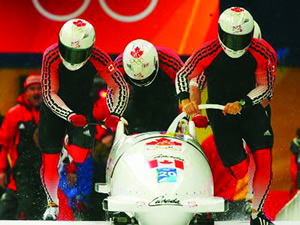 When surveyed for this article, every QSB grad working at VANOC expressed appreciation and a sense of good fortune to be involved in this exciting project (see sidebar opposite). John cites a couple of the main benefits. “Just being part of a big project that has a huge positive impact on the community and the country has been enormously rewarding. I was fortunate enough to be involved in Expo 86, and it was the same sort of thing. It transformed the city and was seen to be very positive.
When surveyed for this article, every QSB grad working at VANOC expressed appreciation and a sense of good fortune to be involved in this exciting project (see sidebar opposite). John cites a couple of the main benefits. “Just being part of a big project that has a huge positive impact on the community and the country has been enormously rewarding. I was fortunate enough to be involved in Expo 86, and it was the same sort of thing. It transformed the city and was seen to be very positive.
All The Venues Have Been Completed Well In Advance Of The Games - A First For Any Winter Olympic Organizing Committee.
“It has also been exciting to work with members of a terrific team. From those who are employed by VANOC to our various partners and other agencies, there’s been a real sense of excitement.”
As reflected in VANOC’s values, teamwork is integral to the planning of the Games. “Just about everything is done in teams,” says Terry. “Because of the nature of what we do and how every aspect is so integrated, teamwork is a really important piece.”
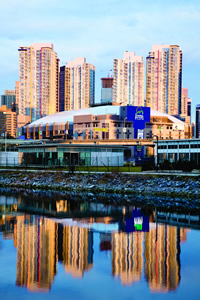 Canada Hockey Place, the competition site for Olympic ice hockey Terry believes that it’s no coincidence that so many Queen’s grads are on the VANOC team. “I’m proud that we have Queen’s grads here. The School attracts people with an appetite for challenge. I think those who graduated from Queen’s would agree it had a marked impact on their lives. If we can have even a bit of that effect on the people who come into contact with this project, we’ll be doing well.”
Canada Hockey Place, the competition site for Olympic ice hockey Terry believes that it’s no coincidence that so many Queen’s grads are on the VANOC team. “I’m proud that we have Queen’s grads here. The School attracts people with an appetite for challenge. I think those who graduated from Queen’s would agree it had a marked impact on their lives. If we can have even a bit of that effect on the people who come into contact with this project, we’ll be doing well.”
He is also very excited about the impact Canadian Olympic and Paralympic athletes can have in fostering national pride and inspiring young people across the country. “With our government partners and corporate sponsors we have made a significant financial commitment for athlete preparation through the ‘Own the Podium’ program. I don’t believe anything like this has been done before by an organizing committee.”
“Canada is the only country in the world to have hosted the Olympic Games and not won a gold medal, and we’ve done it twice. We’re trying to help get the financial support our athletes need to be at the top of their game. ‘Own the Podium’ needs the support of all Canadians. Whether supporting athletes directly through the program or through a sponsor’s fundraising initiative – if every Canadian were to give $20.10, it would go a long way to ensuring our athletes achieve success in 2010.Their achievements would generate tremendous pride for all Canadians.”
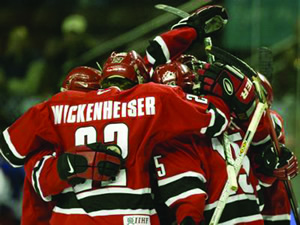 In the run-up to the opening ceremonies on February 12, 2010, the VANOC team is in high gear already. “We’re in the midst of an exponential growth“, says Terry. “We have a staff of 1,000 people now and at Games time we’ll be about 50,000 strong. It’s very important that we build that team with the right culture,make sure it’s trained, has practised and is ready to deliver with excellence. There are an awful lot of moving parts that must co-ordinate in a synchronized fashion, and you don’t have a second chance to get it right. We need to be very good on opening day.” They had better be: Canada, and the world, will be watching.
In the run-up to the opening ceremonies on February 12, 2010, the VANOC team is in high gear already. “We’re in the midst of an exponential growth“, says Terry. “We have a staff of 1,000 people now and at Games time we’ll be about 50,000 strong. It’s very important that we build that team with the right culture,make sure it’s trained, has practised and is ready to deliver with excellence. There are an awful lot of moving parts that must co-ordinate in a synchronized fashion, and you don’t have a second chance to get it right. We need to be very good on opening day.” They had better be: Canada, and the world, will be watching.
For more information about Olympic »
Interested in purchasing Olympic apparel?
Other QSB Alumni Making Their Mark At Vanoc
 Benjy Berger, BCom’97
Benjy Berger, BCom’97
Manager, Merchandising
Benjy is responsible for marketing Vancouver 2010 merchandise as well as developing retail channels such as the Olympic Stores at Vancouver International Airport and the Bay Downtown Vancouver, along with Vancouver 2010 venues and VANOC’s online store.
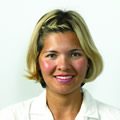 Ali Gardiner, BCom’97
Ali Gardiner, BCom’97
Vice President, Brand and Creative Services
Ali drives the development and implementation of Vancouver 2010 brand positioning, architecture, identities and symbols. She leads a team of 30 that includes project managers, graphic designers, planners, production managers and video producers.
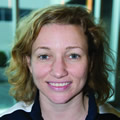 Mary Thomson, BCom’95
Mary Thomson, BCom’95
Manager, Business Systems
Mary’s function is to handle project management and business analysis for the development and implementation of flexible information systems that will be used before and during the Games.
 Don Ford, BCom’97
Don Ford, BCom’97
Manager, Finance
Don oversees the design and operation of financial processes and transactions along with the budget and revenue collection process of larger revenue streams, such as ticketing and accommodations.
 Chris Gear, BCom’95, LLB’98
Chris Gear, BCom’95, LLB’98
Director and Senior Counsel, Legal Affairs
Chris is responsible for the drafting, negotiation and legal approval of contracts in areas throughout the organization, including venue construction, procurement of goods and services, facility/venue use, sponsorship, licensing, accommodation and human resources.
 Dick Vollet, Queen’s Executive Program’99
Dick Vollet, Queen’s Executive Program’99
Vice President, Mountain Venue Operations
Dick is responsible for leading the operations of nine competition, eight non-competition and three training venues, for ensuring that all client group needs are met and that operational procedures are implemented for all venue activities.
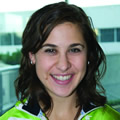 Katrina Galas, BCom’05
Katrina Galas, BCom’05
Coordinator, Brand and Advertising
Katrina is part of the team that develops strategy and executes functional advertising campaigns and communications projects for numerous functions. She also assisted in the development of the Vancouver 2010 motto and thematic television spot and print campaign.
 Shane Holland, MBA’04
Shane Holland, MBA’04
Manager, VIK and Sponsorship Revenue
Shane is responsible for the financial oversight of the Vancouver 2010 sponsorship program from contract negotiation to ongoing management. He is also accountable for developing and implementing programs to ensure the effective use of all value-in-kind sponsor contributions.
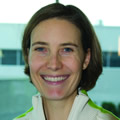 Leah Walton, BCom’97
Leah Walton, BCom’97
Contractor, Brand and Advertising
Leah’s responsibilities during her 10-month contract include strategy, development and execution of Cultural Olympiad advertising, national market research, and graphic standards and guidelines for all Vancouver 2010 graphics for broadcast.
